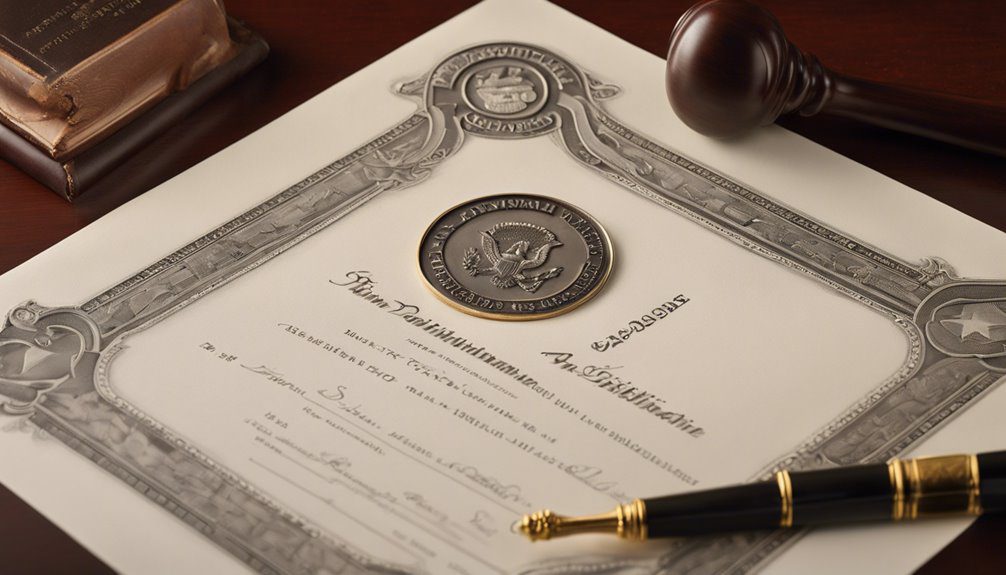If you're considering starting an auction business in Pennsylvania, understanding the Pennsylvania Auction Company Bond is essential. This bond not only safeguards your clients but also reinforces your company's reputation in a competitive market. You'll need to navigate various legal requirements and types of bonds available to find the right fit for your operation. But what happens if you fail to comply with these obligations? The implications could be significant, and knowing how to maintain compliance is equally important. There's much more to unpack in this vital topic.
What Is an Auction Company Bond?

An auction company bond is a crucial financial tool that ensures trust and accountability in the auction process. This bond acts as a form of insurance for both bidders and sellers, protecting them from potential misconduct or unethical practices by the auction company.
When you participate in an auction, you want to know that the company facilitating the event is reliable and compliant with state regulations. Essentially, the bond guarantees that the auction company will adhere to the laws governing auctions in Pennsylvania.
If they fail to meet these obligations, the bond provides a financial safety net, allowing affected parties to recover losses incurred due to the company's actions.
In Pennsylvania, obtaining an auction company bond is often a requirement for licensure. This means that if you're looking to start an auction business, you'll need to secure this bond beforehand.
It demonstrates your commitment to ethical practices and reinforces your credibility in the eyes of clients and competitors alike. So, when you're considering an auction, knowing that the company holds a valid bond gives you peace of mind and confidence in the integrity of the auction process. Additionally, auctioneer bonds ensure trust between buyers and sellers, promoting fair competition and safeguarding against unethical practices.
Importance of the Bond
Understanding the importance of the auction company bond is essential for anyone involved in the auction process. This bond serves as a safety net, protecting both buyers and sellers from potential fraud or mismanagement.
When you engage with a licensed auction company, knowing they've a bond in place gives you peace of mind. It assures you that they're committed to ethical practices and will handle transactions responsibly.
If an auction company fails to meet its obligations, the bond can provide financial compensation for losses incurred. This means you won't be left high and dry if something goes wrong.
Additionally, having a bond can enhance the reputation of the auction company, making it more appealing to clients. It signals that they take their responsibilities seriously and are willing to back up their services with financial guarantees.
In a competitive market, a strong bond can set an auction company apart from others. It demonstrates reliability and integrity, crucial factors that buyers and sellers look for in their auction partners. Furthermore, the bond amount can vary based on the financial risk associated with the bond, indicating the level of trustworthiness expected from the auction company.
Legal Requirements in Pennsylvania

In Pennsylvania, auction companies must adhere to specific legal requirements to operate legally and maintain their bonds. First, you need to register your auction business with the appropriate state and local authorities. This process often involves submitting an application, providing proof of your business structure, and paying any associated fees.
Next, you must obtain the necessary licenses. Depending on your auction's nature and the items being sold, you may need a general auctioneer's license or additional permits. Make sure to check the specific regulations that apply to your situation.
Additionally, maintaining a surety bond is crucial. This bond protects your clients from potential misconduct, ensuring that you adhere to ethical business practices. The bond amount often varies based on your auction's size and scope, so confirm the requirements with your local regulatory body. Illinois Surety Bonds are a helpful reference for understanding the different types of bonds required.
Don't forget to keep accurate records of all transactions and abide by consumer protection laws. This compliance not only protects your clients but also strengthens your business's reputation.
Types of Auction Company Bonds
When starting an auction company, knowing the different types of bonds available is essential for compliance and credibility.
There are primarily two types of auction company bonds you should be aware of: license bonds and bid bonds.
License bonds protect the public by ensuring that you adhere to state regulations and ethical standards. By securing a license bond, you assure clients and regulatory bodies that you'll conduct your business honestly and responsibly. If you fail to meet these obligations, the bond provides financial compensation to affected parties.
Bid bonds, on the other hand, are typically required for specific projects or auctions. They guarantee that you'll honor your bid and enter into a contract if selected. If you back out, the bond compensates the project owner for any losses incurred.
Both types of bonds serve as a form of insurance, enhancing your reputation and instilling trust in your clients. Understanding the importance of debt consolidator bonds can further highlight the necessity of securing appropriate bonds for your auction business.
Understanding these distinctions can help you choose the right bond for your auction business, ensuring you meet all legal requirements and maintain a reputable standing in the industry.
How to Obtain the Bond

How can you navigate the process of obtaining an auction company bond? First, determine the specific bond requirements set by Pennsylvania's regulatory authorities. This typically includes the bond amount you'll need based on your auction company's projected revenue.
Next, gather the necessary documentation. You'll likely need to provide proof of your business license, financial statements, and possibly personal information, such as your credit score. This information helps surety companies assess your eligibility for the bond.
Once you have everything ready, reach out to a surety bond agency or company. They'll guide you through the application process and help you understand any additional requirements. Be prepared to answer questions about your business operations and financial history.
After you submit your application, the surety company will review it and determine your bond premium. If approved, you'll receive the bond documents, which you'll need to sign and return.
Costs Associated With the Bond
Understanding the costs associated with obtaining a Pennsylvania auction company bond is crucial for budgeting your startup expenses. The primary cost you'll face is the premium, which typically ranges from 1% to 3% of the bond amount.
For example, if you're required to secure a $10,000 bond, expect to pay between $100 and $300 annually.
You'll also want to consider additional fees, such as application fees or charges for credit checks. These can vary by provider and might add another $50 to $150 to your overall costs.
If you have a less-than-stellar credit history, be prepared for higher premiums, as your credit score directly influences the rate you'll pay.
In some cases, you may need to provide collateral, which could tie up funds that you'd rather invest elsewhere.
It's wise to shop around and compare quotes from different surety bond companies to find the best deal.
Ultimately, being aware of these costs will help you plan more effectively and ensure your auction business starts off on the right financial foot.
Maintaining Bond Compliance

Maintaining bond compliance is essential for your auction company's success and longevity. To ensure you're meeting all requirements, familiarize yourself with the specific regulations governing your bond. These rules often include maintaining financial stability, adhering to ethical practices, and staying updated on local laws.
Regularly review your financial records and ensure they align with the bond's stipulations. If there's a change in your business structure or financial status, report it promptly to the bonding authority. This transparency builds trust and prevents potential legal issues.
It's also vital to stay informed about any shifts in state regulations regarding auction practices. Attend relevant workshops or seminars to keep your knowledge current. Networking with other auction professionals can also provide valuable insights into compliance best practices.
Lastly, consider seeking legal or professional advice if you're unsure about any compliance aspects. This proactive approach can save you from costly penalties or even losing your bond.
Conclusion
In summary, a Pennsylvania Auction Company Bond is essential for your auction business, ensuring compliance and building trust with clients. By obtaining this bond, you not only protect yourself against potential fraud but also enhance your credibility in the market. Remember to stay informed about legal requirements and maintain compliance to keep your bond active. Prioritizing this bond can lead to a more successful and reputable auction operation, ultimately benefiting both you and your clients.


